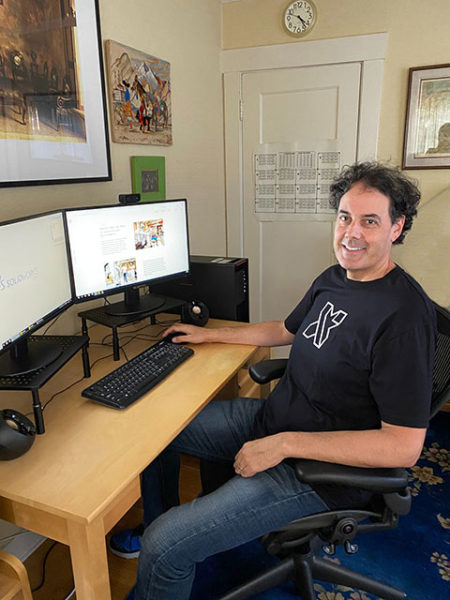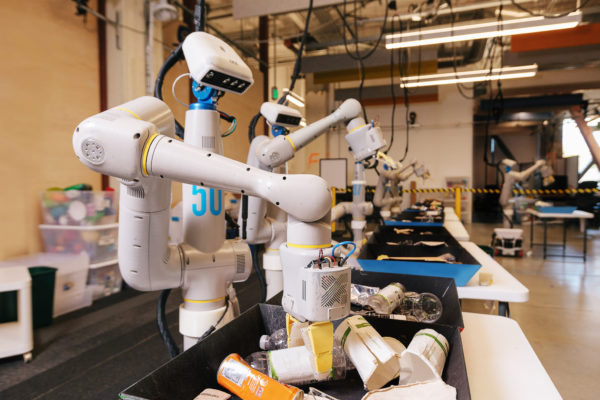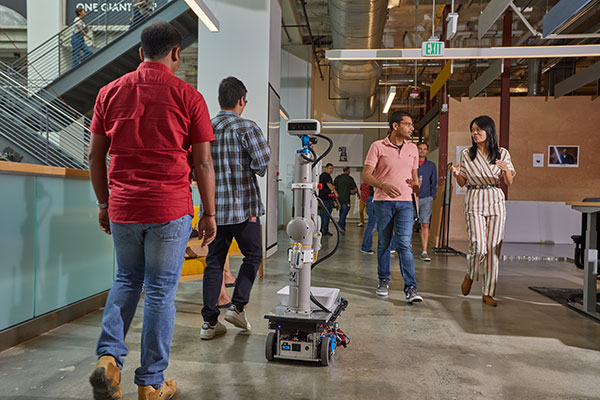Curiosity drives Fletcher Ewing.
As a kid, it drove him to build and race Soap Box Derby cars. As a college student, it led him to study plastics. As a professional, it inspires him to “shoot for the moon.”
The 1998 Pennsylvania College of Technology graduate and Selinsgrove native is a senior mechanical engineer in Silicon Valley for X, The Moonshot Factory. Formerly known as Google X, the company consists of inventors, engineers and entrepreneurs whose expectations defy gravity. Their objective is to build and launch “technologies that aim to improve the lives of millions, even billions of people.”
 X initiatives include driverless cars, delivery drones and balloons providing internet access to rural regions. Ewing’s focus is X’s Everyday Robot Project, which is dedicated to building robots that can operate autonomously in unstructured human environments, such as homes and offices.
X initiatives include driverless cars, delivery drones and balloons providing internet access to rural regions. Ewing’s focus is X’s Everyday Robot Project, which is dedicated to building robots that can operate autonomously in unstructured human environments, such as homes and offices.
“We see robots as tools that we can put to work to extend humanity’s capabilities,” said Ewing, whose team focuses on the hardware and design of the robots. “We believe that machine learning and robotics could one day help us find new solutions to some of the biggest challenges facing the world – from finding new ways to live sustainably to caring for loved ones to tasks we’ve not even imagined.”
Today, most robots are built to perform specific functions in structured and predictable environments. But X – a subsidiary of Alphabet, Google’s parent company – develops its robots to have the humanlike capacity to learn and adapt.
Current testing at X headquarters in Mountain View, California, requires robots – relying on artificial intelligence software and equipped with cameras, sensors and one “arm” – to grasp and accurately sort waste into bins earmarked for landfill, recycling and compost.
“We have tens of thousands of virtual robots running in the cloud to learn this task nightly,” Ewing said. “What’s gained in experience and learning is then transferred and shared to the physical robots. We have reduced contaminated waste from 20% to less than 5%. This proves that robots can learn tasks in the real world through practice versus having to code every new task, exception or improvement.”
According to X, developing the general-purpose learning robots “requires tackling and integrating some of the hardest hardware and software challenges in the field of robotics.” That fact doesn’t scare Ewing. In fact, he welcomes the Herculean task.
“With problems come solutions. X’s mission is to solve difficult problems,” he said. “You have to accept you may not get it right after multiple attempts. In my opinion, failure is part of being an engineer and has been part of my experience since the beginning.”
That experience includes several years as a mechanical engineer for projects impacting numerous industries. At Cross Match Technologies, Ewing’s team created the handheld mobile biometric device employed by U.S. Navy Seals to identify the remains of Osama bin Laden. At Fluidra, he was the lead engineer in designing the Polaris Quattro, a submersible autonomous robotic pool cleaner. At Aerospace Technologies Group, he developed materials, parts and components for the interiors of business jets and premium airliners.
Last year, Ewing discovered the next “great match” for his background when he saw a job opening at X on LinkedIn.
“I was thrilled to join a renowned company working on such a rewarding and challenging project,” he said. “Robotics is a team sport that requires people from diverse backgrounds and disciplines to come together and collaborate. Since I love innovation, it gives me great pride to contribute to the goals at hand.”
Ewing traces his love of innovation to childhood when he and his brother built and raced Soap Box Derby cars throughout Pennsylvania and at the national championships in Akron, Ohio. When he outgrew the Derby, his new interests – go-karts, rocketry, motorcycles and remote-control cars – required enhanced mechanical ability, engineering and curiosity.
 “To enjoy those hobbies, I had to do my research and be creative, talk to older, experienced people, go to the library, and experience lots of trial and error,” he said.
“To enjoy those hobbies, I had to do my research and be creative, talk to older, experienced people, go to the library, and experience lots of trial and error,” he said.
Shortly after graduating from high school, Ewing put his engineering aspirations on hold. The death of his father prompted Ewing and his brother to become full-time employees of the family’s company, which sold building products. A few years later, the business closed, opening a new path for Ewing that led to Penn College.
Attracted to its “uncommon and specialized” focus, he enrolled in the plastics and polymer engineering technology program. Penn College is one of only six institutions nationwide offering plastics degrees that are accredited by the Engineering Technology Accreditation Commission of ABET.
“I wanted to get into new product development involving plastics materials or composites in some shape or form,” Ewing said. “Even though my career path changed, I still work with plastics, materials science and injection molding frequently.”
The diversity of Ewing’s career is a common attribute of Penn College plastics graduates, according to Kirk M. Cantor, professor of plastics and polymer technology.
“Pretty much everything dealing with electronics and technology has plastic components involved,” said Cantor, who remembers Ewing as a diligent student with a good attitude.
“Because our students are working with state-of-the-art plastics technology, they are exposed to ancillary type of technologies. Many graduates do migrate from working directly with plastics to focus on other technologies, and they do well.”
“What I learned during my studies was instrumental in giving me an advantage at work,” Ewing said. “I’ve utilized my education in every role I have held since earning my degree.”
 For the foreseeable future, Ewing sees himself continuing in his role with the Everyday Robot Project. Whether he is prototyping in the company’s 20,000-square-foot workshop or designing from home due to the COVID-19 pandemic, he loves the “job, people and culture” at X.
For the foreseeable future, Ewing sees himself continuing in his role with the Everyday Robot Project. Whether he is prototyping in the company’s 20,000-square-foot workshop or designing from home due to the COVID-19 pandemic, he loves the “job, people and culture” at X.
The reality that it could be several years before the robots he and the rest of the team envision become a fabric of society doesn’t faze him.
“The challenge is what drives me and inspires me to be both creative and inventive in solving problems,” Ewing said. “I aim to be a lifelong learner and feed my curiosity as much as possible.”
Penn College offers a bachelor’s degree in plastics and polymer engineering technology and an associate degree in plastics and polymer technology.
For information about those and other majors from the School of Engineering Technologies, call 570-327-4520.
Penn College is a national leader in applied technology education. Email the Admissions Office or call toll-free 800-367-9222.
As a kid, it drove him to build and race Soap Box Derby cars. As a college student, it led him to study plastics. As a professional, it inspires him to “shoot for the moon.”
The 1998 Pennsylvania College of Technology graduate and Selinsgrove native is a senior mechanical engineer in Silicon Valley for X, The Moonshot Factory. Formerly known as Google X, the company consists of inventors, engineers and entrepreneurs whose expectations defy gravity. Their objective is to build and launch “technologies that aim to improve the lives of millions, even billions of people.”
 X initiatives include driverless cars, delivery drones and balloons providing internet access to rural regions. Ewing’s focus is X’s Everyday Robot Project, which is dedicated to building robots that can operate autonomously in unstructured human environments, such as homes and offices.
X initiatives include driverless cars, delivery drones and balloons providing internet access to rural regions. Ewing’s focus is X’s Everyday Robot Project, which is dedicated to building robots that can operate autonomously in unstructured human environments, such as homes and offices.“We see robots as tools that we can put to work to extend humanity’s capabilities,” said Ewing, whose team focuses on the hardware and design of the robots. “We believe that machine learning and robotics could one day help us find new solutions to some of the biggest challenges facing the world – from finding new ways to live sustainably to caring for loved ones to tasks we’ve not even imagined.”
Today, most robots are built to perform specific functions in structured and predictable environments. But X – a subsidiary of Alphabet, Google’s parent company – develops its robots to have the humanlike capacity to learn and adapt.
Current testing at X headquarters in Mountain View, California, requires robots – relying on artificial intelligence software and equipped with cameras, sensors and one “arm” – to grasp and accurately sort waste into bins earmarked for landfill, recycling and compost.
“We have tens of thousands of virtual robots running in the cloud to learn this task nightly,” Ewing said. “What’s gained in experience and learning is then transferred and shared to the physical robots. We have reduced contaminated waste from 20% to less than 5%. This proves that robots can learn tasks in the real world through practice versus having to code every new task, exception or improvement.”
According to X, developing the general-purpose learning robots “requires tackling and integrating some of the hardest hardware and software challenges in the field of robotics.” That fact doesn’t scare Ewing. In fact, he welcomes the Herculean task.
“With problems come solutions. X’s mission is to solve difficult problems,” he said. “You have to accept you may not get it right after multiple attempts. In my opinion, failure is part of being an engineer and has been part of my experience since the beginning.”
That experience includes several years as a mechanical engineer for projects impacting numerous industries. At Cross Match Technologies, Ewing’s team created the handheld mobile biometric device employed by U.S. Navy Seals to identify the remains of Osama bin Laden. At Fluidra, he was the lead engineer in designing the Polaris Quattro, a submersible autonomous robotic pool cleaner. At Aerospace Technologies Group, he developed materials, parts and components for the interiors of business jets and premium airliners.
Last year, Ewing discovered the next “great match” for his background when he saw a job opening at X on LinkedIn.
“I was thrilled to join a renowned company working on such a rewarding and challenging project,” he said. “Robotics is a team sport that requires people from diverse backgrounds and disciplines to come together and collaborate. Since I love innovation, it gives me great pride to contribute to the goals at hand.”
Ewing traces his love of innovation to childhood when he and his brother built and raced Soap Box Derby cars throughout Pennsylvania and at the national championships in Akron, Ohio. When he outgrew the Derby, his new interests – go-karts, rocketry, motorcycles and remote-control cars – required enhanced mechanical ability, engineering and curiosity.
 “To enjoy those hobbies, I had to do my research and be creative, talk to older, experienced people, go to the library, and experience lots of trial and error,” he said.
“To enjoy those hobbies, I had to do my research and be creative, talk to older, experienced people, go to the library, and experience lots of trial and error,” he said.Shortly after graduating from high school, Ewing put his engineering aspirations on hold. The death of his father prompted Ewing and his brother to become full-time employees of the family’s company, which sold building products. A few years later, the business closed, opening a new path for Ewing that led to Penn College.
Attracted to its “uncommon and specialized” focus, he enrolled in the plastics and polymer engineering technology program. Penn College is one of only six institutions nationwide offering plastics degrees that are accredited by the Engineering Technology Accreditation Commission of ABET.
“I wanted to get into new product development involving plastics materials or composites in some shape or form,” Ewing said. “Even though my career path changed, I still work with plastics, materials science and injection molding frequently.”
The diversity of Ewing’s career is a common attribute of Penn College plastics graduates, according to Kirk M. Cantor, professor of plastics and polymer technology.
“Pretty much everything dealing with electronics and technology has plastic components involved,” said Cantor, who remembers Ewing as a diligent student with a good attitude.
“Because our students are working with state-of-the-art plastics technology, they are exposed to ancillary type of technologies. Many graduates do migrate from working directly with plastics to focus on other technologies, and they do well.”
“What I learned during my studies was instrumental in giving me an advantage at work,” Ewing said. “I’ve utilized my education in every role I have held since earning my degree.”
 For the foreseeable future, Ewing sees himself continuing in his role with the Everyday Robot Project. Whether he is prototyping in the company’s 20,000-square-foot workshop or designing from home due to the COVID-19 pandemic, he loves the “job, people and culture” at X.
For the foreseeable future, Ewing sees himself continuing in his role with the Everyday Robot Project. Whether he is prototyping in the company’s 20,000-square-foot workshop or designing from home due to the COVID-19 pandemic, he loves the “job, people and culture” at X.The reality that it could be several years before the robots he and the rest of the team envision become a fabric of society doesn’t faze him.
“The challenge is what drives me and inspires me to be both creative and inventive in solving problems,” Ewing said. “I aim to be a lifelong learner and feed my curiosity as much as possible.”
Penn College offers a bachelor’s degree in plastics and polymer engineering technology and an associate degree in plastics and polymer technology.
For information about those and other majors from the School of Engineering Technologies, call 570-327-4520.
Penn College is a national leader in applied technology education. Email the Admissions Office or call toll-free 800-367-9222.
Photos courtesy of X, The Moonshot Factory (unless otherwise noted)
